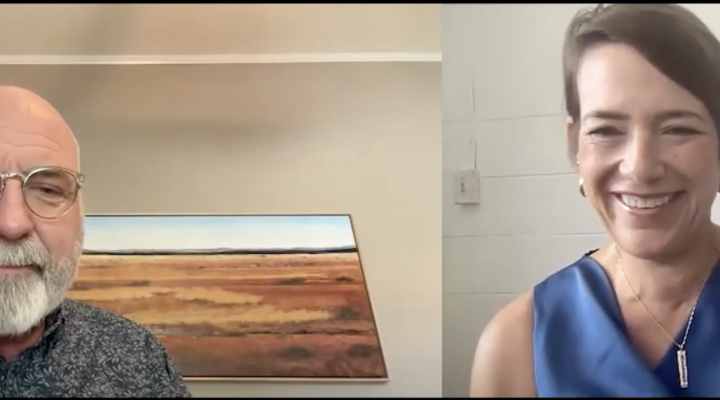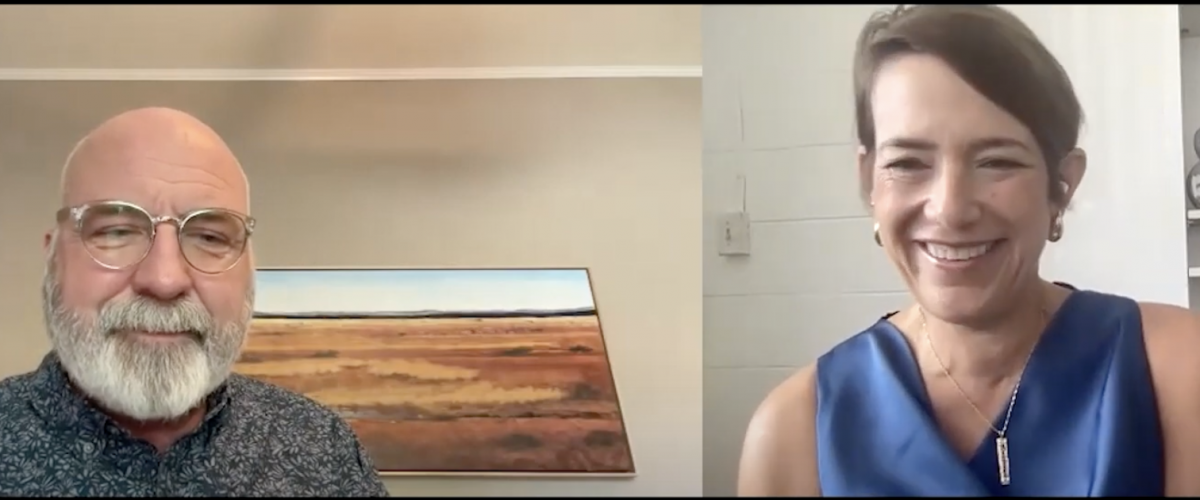Amy Butler’s new book, Beautiful and Terrible Things, is an effort to expose her own struggles as a woman, a mother, a Christian and a high-profile pastor without shining too bright a light on the failings of others, she said.
“This is not a tell-all. I always remember something I heard Nadia Bolz-Weber say: ‘We write from our scars, not from our wounds,’” Butler said during a Sept. 28 webinar hosted by Baptist News Global and moderated by its executive director, Mark Wingfield. “This is not a place for me to bleed all over everybody or to justify my own story. It’s just for me to tell the truth as best as I can tell it, and I hope I succeeded. It’s going to leave some people asking for more.”
That’s especially true about the chapter on her controversial departure from The Riverside Church in New York City in 2019, where she served five years as the high-profile congregation’s first female senior pastor.
“That feels really scary to me, but I did leave certain things in and leave certain things out, very specifically,” said Butler, a Baptist minister and native Hawaiian who currently serves as interim pastor of Community Church of Honolulu and is the founder of Invested Faith, a philanthropic group that repurposes money from dying churches into grants to social entrepreneurs.
With a title inspired by the writing of theologian Frederick Buechner, the book covers the painful and joyful chapters of Butler’s life, including the loss of a child, surviving an unanticipated divorce and the challenges of being the first woman in several roles to which she was called. But most of all, Butler said, the book is about the importance of authenticity within relationships and communities of faith.
“If there’s one thing I hope this book does, it is to give us a little bit of courage to tell the truth about our lives, especially as pastors.”
“If there’s one thing I hope this book does, it is to give us a little bit of courage to tell the truth about our lives, especially as pastors,” she said. “My generation was encouraged to show up, sit up front, be all shiny, be a good example. You can’t ever be real. And honestly, I don’t have enough time to be two different people and I’ve never been very good at it, obviously. So, my theory is that the best communities are built when people have the courage to tell the truth about their lives.”
That conclusion, she said, derives from hard-earned experience. She served as interim minister at National City Christian Church in Washington, D.C. after leaving Riverside Church. Previously, she was senior pastor at Calvary Baptist Church in Washington, D.C., and before that served as associate pastor at St. Charles Avenue Baptist Church in New Orleans.
It was in New Orleans that Butler said she first “fell in love” with church leadership and came to see the healing power of congregations where members are engaged in open connection with each other.
“What I learned at St. Charles was that I wanted to spend my life with the institution. And the reason is that redemptive communities of people who tell the truth about their lives and the world can actually make significant change.”
The homeless shelter she ran in New Orleans prior to joining the staff at St. Charles also helped with that insight, she said. “Ironically, this is where I learned how to be a pastor. Everybody in my congregation had the same problems the women in my shelter had, they just had more resources to hide them and to hide the reality of their lives.”
That’s a theme Butler said she sees coursing through all the facets of her life: “The book is meant to be a collection of stories of relationships that have changed me, and I hope it might encourage local pastors. Being a local pastor right now is harder than it ever has been. Institutions are in decline. We’re being asked to do so many crazy things that we never learned in seminary. I’m seeing it from this church that I’m being the interim at. They can’t find a pastor. And so, we’re becoming more and more rare, and that’s directly related to the fact that our work is so deeply personal and hard.”
“The book is meant to be a collection of stories of relationships that have changed me, and I hope it might encourage local pastors.”
Learning that lesson has been tremendously painful and inspiring at times, with the church often at the center of both cases, she explained. The chapter on her messy departure from Riverside in 2019 — a period that included being stalked buy paparazzi when she took out the trash and celebrity reporters prying into her residence and personal life — is actually about the way pastors and others feel when institutions let them down.
“That certainly is not the only institution that has ever let me down,” she said. “There are many that have, and you don’t even have to be a pastor to understand it when your job, volunteer organization, marriage or some institution that you believed in really lets you down. I often conflated God and the institution of church, and so my tangles with church institutions have really impacted my faith.”
Such friction frequently resulted in periods of unbelief followed by a renewal of faith, she explained. “Usually, the church is the one who ushers in both of those for me. I can remember a period of time at Calvary. We were in such conflict for about two years that I would get in the pulpit every Sunday and I didn’t believe in God.”
But a cohort of fellow pastors guided her through that phase. “They just said to me, ‘We’re going to hold your faith for you. Ask all the questions you need to ask. You’re in the right place. We’ll hold your faith for you.’ I cannot thank them enough. They saved my life. And how would the world change if the church could be that for each other?”
Butler also credited the congregation at Calvary for “saving me and saving my faith” when the congregation insisted on exploring becoming fully inclusive of LGBTQ people.
“We had just come out of all this conflict and I was, ‘Oh, my God, please, no, I don’t want to do.’ It would just be don’t ask, don’t tell, stop at the Pride parade. And they were adamant. They designed this whole process we lived through. And the end result of our decision was so deeply beautiful and the best expression of what the church could be, that it was one of those situations where my faith in the institution was renewed.”
Many of the faith-challenging experiences Butler has encountered resulted from being a woman in ministry and from being the first female to hold the positions she had.
Many of the faith-challenging experiences Butler has encountered resulted from being a woman in ministry and from being the first female to hold the positions she had. Beautiful and Terrible Things shares “what it’s like when you’re not accepted in an institution that you deeply love and believe in because of something about yourself that you cannot change. Our LGBTQ neighbors and so many others of us feel rejected by the church.”
The sting of rejection for women in ministry also has come from unfair treatment by church members or leaders who openly object to women’s hairstyles, fingernail color or overall appearance — issues male ministers never would face, she said. She recalled being asked to leave the sanctuary of her own church when she was practicing a sermon and the security team didn’t believe she was the pastor.
“It’s funny and it’s not funny,” she said. “I write about my daughter a lot in this book because my journey as the first woman in one of the most prominent pulpits in our field, and I still fell off the top and had pictures of me taking out the garbage printed in the New York Post. I don’t want that for my daughter. I don’t want that for other people’s daughters. Just get over it already.”
Another reality many women in ministry encounter is being called to shepherd historic but declining churches white men no longer want to lead. “When those jobs were important, they belonged to men. And then when they started declining in terms of social influence and power, the women took over.”
Instead of blaming the women leading those and other churches for their declines in giving and membership, they should be encouraged and supported for the challenge they have taken on, Butler said. “Give every woman pastor an MBA because we’re the ones having to think creatively about what the future looks like.”
Butler relays a similar episode when she writes about her divorce in 2009. “When you’re a pastor and you get divorced, it’s like you’re experiencing personal tragedy in front of an audience. And at the time, I didn’t know any pastors who were divorced. And you know from reading the book that my 14-year-old’s first question was, ‘Are you going to get fired?’ Which says something very profound about our institution.’”
But once again, Calvary’s response was life-giving as her disclosure of the situation led to acceptance and support. “The church lets us down again and again and then sometimes it just steps up and it’s the best version of what it could be,” she said. “I would cite that as a time I found my faith again.”
As she was leaving Riverside, Butler founded Invested Faith to help dying congregations across America use their assets as a source of inspiration to future generations.
“Let’s not let all of this money dribble away or go into the hands of developers,” she said. “Let’s plant some seeds in a lot of different places and see what springs up. Because the hardest thing about being a social entrepreneur is finding unrestricted capital and having support. … I hope there will always be stained-glass windows and organs. But until we figure out what we’re going to do with the institution, in the meantime could we please just act like Jesus and throw some seeds around and see what pops up?”


